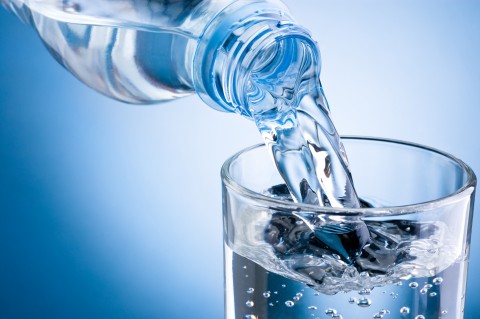The Bottom Line on Bottled Water
 Water. It’s arguably the most important chemical substance on earth, covering 71 percent of the planet and absolutely vital to the survival of every single known life form, including humans. Though it provides no nutritional value and has no color, flavor or odor, water is now the number one bottled drink in America, surpassing soda for the first time ever. According to a study by trade publication Beverage Marketing Corp, Americans now drink an average of 39.3 gallons of bottled water per year, to the tune of $21.3 billion dollars a year. But while this trend of ditching soda may be a big step in the right direction, are we really doing ourselves any favors by drinking bottled water over tap water?
Water. It’s arguably the most important chemical substance on earth, covering 71 percent of the planet and absolutely vital to the survival of every single known life form, including humans. Though it provides no nutritional value and has no color, flavor or odor, water is now the number one bottled drink in America, surpassing soda for the first time ever. According to a study by trade publication Beverage Marketing Corp, Americans now drink an average of 39.3 gallons of bottled water per year, to the tune of $21.3 billion dollars a year. But while this trend of ditching soda may be a big step in the right direction, are we really doing ourselves any favors by drinking bottled water over tap water?
To understand whether tap water is better than bottled, you must first understand the benefits of tap water. Unlike bottled water, most places in the United States fluoridate their municipal (not well-water) water supply. Though undetectable to the senses, fluoride in the water provides a host of benefits to those who drink it. Studies have shown that children who drink fluoridated water have up to a 60 percent lower risk of tooth decay than those who do not drink it, and adults who drink fluoridated water have a 35 percent lower risk. In fact, if consumed while the teeth are still forming, ingested fluoride can make the developing teeth stronger. Ingested fluoride also has the benefit of fluoridating the saliva, helping to protect and strengthen the tooth enamel.
Bottled water, on the other hand, may contain drastically lower levels of fluoride than tap water, unless specifically noted. While the American Dental Association recommends water provide 0.7 to 1.2 ppm of fluoride (or 1 mg/L), most commercial bottled water is either below 0.7ppm or just slightly above it. Most communities that fluoridate their water fall within the 0.7 to 1.2 ppm level, with some falling slightly below and some slightly higher.
While there are several brands of bottled water that contain the recommended levels of fluoride, including some brands marketed for children, most do not contain adequate amounts of fluoride to properly protect the teeth from cavities and decay. Thus, if you find yourself drinking a lot of bottled water, make sure you are getting your fluoride elsewhere, or you could be putting your teeth at risk.
If you want the benefits of fluoridated water but don’t like the taste of your home’s tap water, consider installing a commercial filter or purchasing a filtered water bottle or water pitcher. These devices are relatively inexpensive and while they do a great job filtering out the weird aftertastes associated with tap water, most will not filter out the beneficial fluoride. Other ways you can make up for a shortage of fluoridated water in your diet include prescription fluoride tablets and prescription toothpaste, both available through your dentist.
Ultimately, bottled water is a much better alternative to sodas, fruit juices, and yes, even sparkling waters, but it still may not be doing quite as much as you need it to in terms of fluoride. If you have any questions about whether you or your family are getting enough fluoride protection, give Dr. Lederman a call at 516-882-1764.



